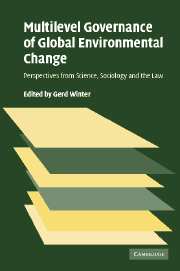 Multilevel Governance of Global Environmental Change
Multilevel Governance of Global Environmental Change Book contents
- Frontmatter
- PREFACE
- Contents
- List of figures
- List of tables
- Notes on contributors
- List of abbreviations
- 1 Introduction
- PART I Earth system analysis
- PART II Society and institutions of global; environmental change
- PART III Self-regulation of industry and the law
- PART IV The potential of the state
- 9 The diffusion of environmental policy innovations
- 10 Process-related measures and global environmental governance
- 11 The impact of the USA on regime formation and implementation
- 12 Transnational bureaucracy networks: a resource of global environmental governance?
- PART V The potential of world regions
- PART VI Formation and implementation of international regimes
- PART VII Improving the instruments of global governance
- PART VIII Fundamental concepts of institutionalising common concern
- Index
10 - Process-related measures and global environmental governance
Published online by Cambridge University Press: 04 May 2010
- Frontmatter
- PREFACE
- Contents
- List of figures
- List of tables
- Notes on contributors
- List of abbreviations
- 1 Introduction
- PART I Earth system analysis
- PART II Society and institutions of global; environmental change
- PART III Self-regulation of industry and the law
- PART IV The potential of the state
- 9 The diffusion of environmental policy innovations
- 10 Process-related measures and global environmental governance
- 11 The impact of the USA on regime formation and implementation
- 12 Transnational bureaucracy networks: a resource of global environmental governance?
- PART V The potential of world regions
- PART VI Formation and implementation of international regimes
- PART VII Improving the instruments of global governance
- PART VIII Fundamental concepts of institutionalising common concern
- Index
Summary
Introduction
There is hardly any other subject in the broad area of trade and environment subject to so much political and academic discussion than the legality of process-related measures. Even though the problem of so-called processes and production measures (PPMs) is certainly not new in the international economic and environmental system, it was not until the WTO Panel decision in the Tuna I case that it attracted intense scrutiny. However, even though extensive material on the legality of PPMs has been produced in recent years, the overall complexity of the problem still appears to lack thorough analysis. This is mainly due to the fact that most scholars are hesitant to present arguments that reach further than making a statement on the (more or less) illegality of PPMs under the current law of the World Trade Organization (WTO). Based on this legal assessment, the environmental civil society, namely environmental NGOs, overwhelmingly see WTO law as an enemy to environmental protection because trade measures based on environmental PPMs are prohibited. Recently, Steve Charnovitz presented a comprehensive study arguing that ‘PPMs affecting trade are not prohibited per se’. A similar conclusion has been put forward by Robert Howse and Donald Regan. Moreover, only more recent studies make an explicit connection between PPMs and environmental governance.
It is not the aim of this contribution to analyse all legal and policy arguments in favour and against the use of PPMs in international economic law in detail.
- Type
- Chapter
- Information
- Multilevel Governance of Global Environmental ChangePerspectives from Science, Sociology and the Law, pp. 254 - 274Publisher: Cambridge University PressPrint publication year: 2006
- 2
- Cited by


